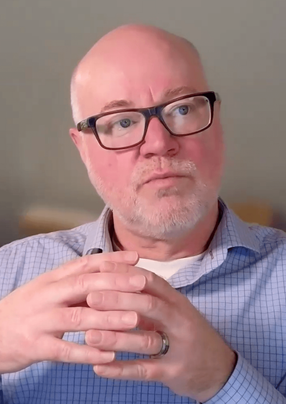
Brad Hopper
Cloud Software Group's VP of Vertical Markets

Brad Hopper, VP of Vertical Markets at Cloud Software Group, has spent his career at the forefront of data analytics in manufacturing and energy. With a background in engineering and a passion for problem-solving, he has helped shape Spotfire's visual analytics technology into a powerful tool for industries ranging from semiconductors to oil and gas.
Brad has a background in manufacturing, including degrees from UC Berkeley, and worked at AMD as a process and yield engineer. Both gave him unique insights into the potential applications of Spotfire's technology.
His journey with Spotfire began in the early days of the company.
"I joined just a few years after the company started. I was employee number 65," he recalls. "The moment I saw Spotfire, I said, ‘this is something that really needs to be in the semiconductor business’," Brad explains.
"Those industries are very underserved from a data analytics perspective. They have these super-advanced, super high-powered and very complex vertical applications. Each of those industries has different ones, and they buy them for four, five million for the plant."
The problem, Brad explains, was that only a handful of people would become experts in these complex systems, creating bottlenecks in data analysis.
He says Spotfire offered a solution: "We can deliver an interactive analysis environment that is not afraid of highly-technical, deeply domain-specific data, and we can apply high powered analytical methods, but the focus is on ease of use."
Spotfire's visual analytics in manufacturing
In the manufacturing sector, particularly in high-tech industries like semiconductors, Spotfire has found a crucial niche in yield engineering.
Brad explains the complexity of the process: "Nvidia has delayed its latest chip because they're having some difficulty between the performance of the chip and the manufacturing of the chip and its packaging."
This is where Spotfire's capabilities come into play, he says: "The solutions that we deliver is identifying patterns and trends in semiconductors.
Spotfire in the energy sector
In the energy sector, Spotfire serves multiple roles across the lifecycle of oil and gas production. Brad outlines three key personas: reservoir engineers and geoscientists, drilling and completions engineers, and production engineers.
"The reservoir engineers decide where the oil and gas company is going to acquire leases and attribute a value to that lease," he explains. "Drilling and completion engineers spend the money, the equipment for drilling and the equipment for completing those wells costs a fortune."
Finally, production engineers operate the equipment. "On an ongoing basis, they collect the resources. And that is also a technical job. It's not just turning on the faucet and then waiting. You have to stimulate the production in multiple ways.”
The future of Spotfire
Looking ahead, Brad foresees exciting developments for Spotfire, particularly in handling even larger datasets and incorporating AI capabilities.
"We’ve started to explore and, well, we already have capabilities to do what we call on demand,” he explains. “So if you have data in a database, in a Hyperscaler cloud data engine, you can query the data dynamically.”
Brad is particularly excited about the integration of large language models (LLMs) into Spotfire's capabilities.
"We can accept Python code that captures those analytic models,” he says. “So, we already have that working today where you can ask the LLM, and we support all three of the major LLMs, open ais chat, GPT, Google's Gemini and Facebook Lama.”
To read the full story in the magazine click HERE
Make sure you check out the latest edition of Manufacturing Digital and also sign up to our global conference series - Manufacturing & Mobility LIVE 2024
Manufacturing Digital is a BizClik brand.


